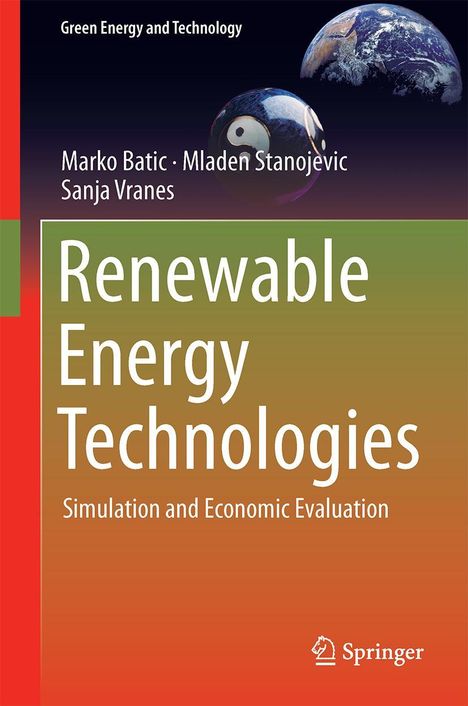Marko Batic: Renewable Energy Technologies, Gebunden
Renewable Energy Technologies
Buch
- Simulation and Economic Evaluation
Artikel noch nicht erschienen, voraussichtlicher Liefertermin ist der 6.10.2025.
Sie können den Titel schon jetzt bestellen. Versand an Sie erfolgt gleich nach Verfügbarkeit.
Sie können den Titel schon jetzt bestellen. Versand an Sie erfolgt gleich nach Verfügbarkeit.
Aktueller Preis: EUR 161,03
- Verlag:
- Springer London, 10/2025
- Einband:
- Gebunden, Book w. online files / update
- Sprache:
- Englisch
- ISBN-13:
- 9781447162773
- Artikelnummer:
- 3789800
- Umfang:
- 300 Seiten
- Sonstiges:
- 30 SW-Abb., 10 Farbabb.,
- Nummer der Auflage:
- 2022
- Ausgabe:
- 2022 edition
- Copyright-Jahr:
- 2015
- Erscheinungstermin:
- 6.10.2025
- Hinweis
-
Achtung: Artikel ist nicht in deutscher Sprache!
Kurzbeschreibung
This book discusses renewable energy technologies, and examines their integration into the green residential microgrids of tomorrow. Describes and precisely simulates a range of energy storage alternatives, as well as typical energy consumption patterns.Beschreibung
Renewable Energy Technologies: Simulation and Economic Evaluation presents currently available renewable energy technologies (RETs) as well as their possible integration into the economically viable and green residential microgrids of tomorrow. The emphasis is on the importance of RETs in today s energy efficient building design, followed by the RET mathematical models suitable for both performance simulation and economic appraisal. A range of energy storage alternatives, as well as typical energy consumption patterns, are also thoroughly described and precisely simulated. After selecting the right components for a hybrid system, readers are introduced to problems of system integration and optimization, via simulations that enable alternative scenario exercises and comparative analysis. The multicriteria comparison also includes detailed investment appraisal, using both conventional methodology and the authors novel green-accounting-based appraisal to investigate the impacts on the economic efficiency of the project.Inhaltsangabe
Introduction to Renewable Energy Technology.- Using RET for Energy Efficient Building Design.-RET Simulation (Solar-Thermal, Solar-Photovoltaic, Wind, Geothermal, Biofuel-Powered Gas Turbines, Etc.).- Energy Storage Simulation.- Load Simulation.- System Simulation for Energy Efficient Building Design / Retrofit.- System Simulation for Real-Time Controller Calibration.- Conventional Economic Appraisal of Renewable Energy Investments.- Green-Accounting-Based Appraisal of Renewable Energy Investments.- Assessing the Risk of Renewable Energy Investments.- Multi-criteria Optimization of RET/Storage Configuration for Energy Efficiency.Klappentext
This book presents currently available renewable energy technologies (RETs) and explores their possible integration into the economically viable and green residential microgrids of tomorrow. The emphasis is on the importance of RETs in today's energy-efficient building designs, and on those RET mathematical models suitable for both performance simulation and economic appraisal. A range of energy storage alternatives, as well as typical energy consumption patterns, are also thoroughly described and precisely simulated. After selecting the right components for a hybrid system, readers are introduced to problems of system integration and optimization, using simulations that support alternative scenario exercises and comparative analysis. The multicriteria comparison also includes detailed investment appraisals, using both conventional methodologies and the authors' novel green-accounting-based appraisal to investigate the impacts on the economic efficiency of the project.
Marko Batic, Mladen Stanojevic, Sanja Vranes
Renewable Energy Technologies
Aktueller Preis: EUR 161,03

